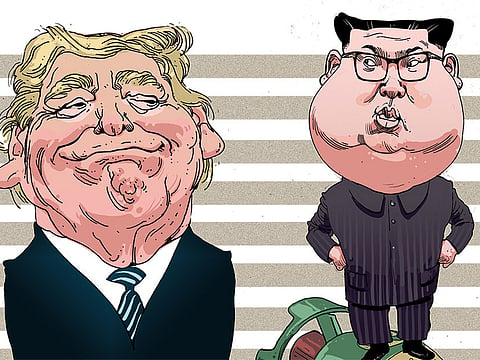Kim emerges stronger in Singapore
The US president made major concessions in Round One with North Korea, for minimal return

It sure looks as if US President Donald Trump was hoodwinked in Singapore. Trump made a huge concession — the suspension of military exercises with South Korea. That’s on top of the broader concession of the summit meeting itself, security guarantees he gave North Korea and the legitimacy that the summit provides his counterpart, Kim Jong-un.
Within North Korea, the “very special bond” that Trump claimed to have formed with Kim will be portrayed this way: Kim forced the US president, through his nuclear and missile tests, to accept North Korea as a nuclear equal, to provide security guarantees to North Korea, and to cancel war games with South Korea that the North has protested for decades.
In exchange for these concessions, Trump seems to have won astonishingly little. In a joint statement, Kim merely “reaffirmed” the same commitment to denuclearisation of the Korean Peninsula that North Korea has repeatedly made since 1992.
“They were willing to de-nuke,” Trump crowed at his news conference after his meetings with Kim. Trump seemed to believe he had achieved some remarkable agreement, but the concessions were all his own.
The most remarkable aspect of the joint statement was what it didn’t contain. There was nothing about North Korea freezing plutonium and uranium programmes, nothing about destroying intercontinental ballistic missiles, nothing about allowing inspectors to return to nuclear sites, nothing about North Korea making a full declaration of its nuclear programme, nothing about a timetable, nothing about verification, not even any clear pledge to permanently halt testing of nuclear weapons or long-range missiles.
Kim seems to have completely out-negotiated Trump, and it’s scary that Trump doesn’t seem to realise this. For now Trump has much less to show than past negotiators who hammered out deals with North Korea like the 1994 Agreed Framework, which completely froze the country’s plutonium programme with a rigorous monitoring system.
Trump made a big deal in his news conference about recovering the remains of US soldiers from the Korean War, but this is nothing new. Back in 1989, on my first trip to North Korea, officials there made similar pledges about returning remains, and indeed North Korea has returned some remains over the years. It’s not clear how many more remain.
Trump claimed an “excellent relationship” with Kim, and it certainly is better for the two leaders to be exchanging compliments rather than missiles. In a sense, Trump has eased the tensions that he himself created when he threatened last fall to “totally destroy” North Korea. I’m just not sure a leader should get credit for defusing a crisis that he himself created.
There’s still plenty we don’t know and lots of uncertainty about the future. But for now, the bottom line is that there’s no indication that North Korea is prepared to give up its nuclear weapons, and Trump didn’t achieve anything remotely as good as the Iran nuclear deal, which led Iran to eliminate 98 per cent of its enriched uranium.
Embracing totalitarianism
There was also something frankly weird about a US president savaging Canada’s prime minister one day and then embracing the leader of the most totalitarian country in the world. In an interview with Voice of America, Trump said “I like him” and added: “He’s smart, loves his people, he loves his country.”
Trump praised Kim in the news conference and, astonishingly, even adopted North Korean positions as his own, saying that the US military exercises in the region are “provocative.” That’s a standard North Korean propaganda line. Likewise, Trump acknowledged that human rights in North Korea constituted a “rough situation,” but quickly added that “it’s rough in a lot of places, by the way.” (Note that a 2014 United Nations report stated that North Korean human rights violations do “not have any parallel in the contemporary world.”)
Incredibly, Trump told Voice of America that he had this message for the North Korean people: “I think you have somebody that has a great feeling for them. He wants to do right by them and we got along really well.”
It’s breathtaking to see a US president emerge as a spokesman for the dictator of North Korea.
Savvy and shrewd North Koreans
All this is to say that Kim proved the more able negotiator. North Korean government officials have to limit their computer time, because of electricity shortages, and they are international pariahs — yet they are very savvy and shrewd, and they were counselled by one of the smartest Trump handlers of all, President Moon Jae-in of South Korea.
Kim flattered Trump, as Moon has, and that Trump simply didn’t realise how little he was getting. On my most recent visit to North Korea, officials were asking me subtle questions about the differences in views of Mike Pompeo and Nikki Haley; meanwhile, Trump said he didn’t need to do much homework.
Whatever our politics, we should all want Trump to succeed in reducing tensions on the Korean Peninsula, and it’s good to see that Trump now supports engagement rather than military options. There will be further negotiations, and these may actually freeze plutonium production and destroy missiles. But at least in the first round, Trump seems to have been snookered.
— New York Times News Service
Nicholas Kristof is an American journalist, author and a winner of two Pulitzer Prizes.



